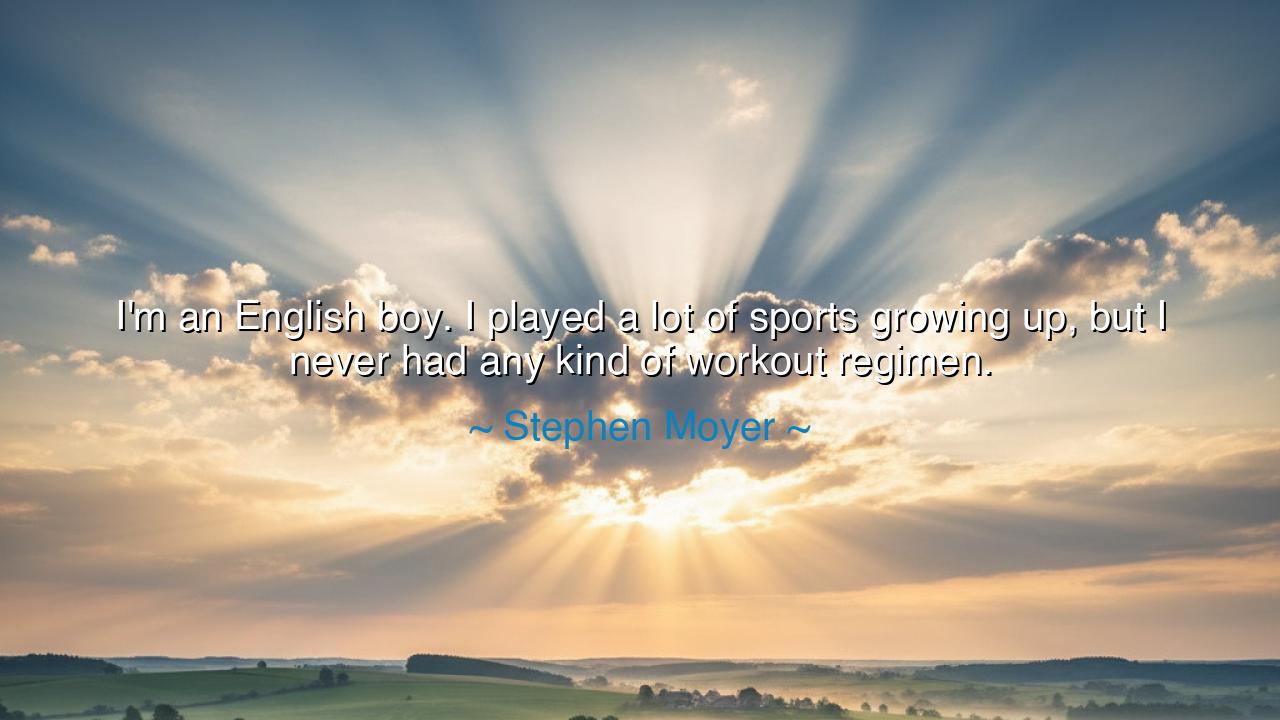
I'm an English boy. I played a lot of sports growing up, but I
I'm an English boy. I played a lot of sports growing up, but I never had any kind of workout regimen.






The words of Stephen Moyer, though spoken plainly, reveal a truth about youth, culture, and the shaping of the body and spirit: “I’m an English boy. I played a lot of sports growing up, but I never had any kind of workout regimen.” At first it seems a light reflection on childhood, yet within it lies the difference between structured discipline and the natural freedom of play, between the strictness of regimens and the organic growth born of passion and community.
He begins by naming himself as an English boy, grounding his memory in a place and a culture. In England, as in many lands, children grow up with fields, games, and friends, where sport is not yet a profession, but a joy. It is in such beginnings that character is formed—not in the weight room, not in the planned regimen, but in the unmeasured hours of running, kicking, throwing, and striving with laughter. His words remind us that in childhood, sport is not yet about efficiency or results; it is about the freedom to move, to discover, to belong.
The absence of a workout regimen reveals something profound. For in our modern age, discipline is often bound to structure, to planned repetitions and rigid methods. But Moyer’s experience shows that strength and endurance can also come from play itself, from the natural striving of the body in games. This is the ancient way: before gyms and programs, warriors grew strong by hunting, farming, wrestling, and laboring under the open sky. Their regimen was life itself.
History offers examples aplenty. The young Spartans, though drilled in the agoge, still gained much of their strength from outdoor contests and the constant trials of living harshly in nature. In another way, Aboriginal peoples of Australia, through daily hunts, dances, and communal games, developed stamina and agility that no artificial training could replicate. Their fitness was not separate from their lives—it was woven into their existence. So too did Moyer, through simple sports, gain a foundation of health without needing a regimen.
The deeper meaning is this: discipline can take many forms. For some it is a strict plan of iron and sweat in the gym, for others it is the consistent joy of sport, play, and activity. Neither way is lesser; what matters is the spirit with which one moves. To love movement is greater than to fear stagnation. To play passionately is greater than to train without heart. What Moyer reminds us is that the roots of strength need not always be forged in rigidity; they can also bloom in the natural soil of youth and joy.
Yet his reflection also carries a lesson for maturity. While play alone may suffice for the young, as life grows heavier and responsibilities expand, intentionality becomes necessary. The adult who neglects discipline will lose what the child gained. Thus, we are called to balance both truths: embrace the joy of play when young, but also honor the discipline of regimen as we grow, so that the flame of strength does not dwindle.
Therefore, children of the future, remember this teaching: life itself is the greatest gymnasium, and play is the first regimen. Run, laugh, strive, compete, and grow strong through joy. But when time and age weigh upon you, do not abandon discipline; let structure join with passion to preserve the vitality that play first gave you. In this harmony lies the wisdom of both youth and age, of freedom and order, of joy and perseverance.
Thus, Stephen Moyer’s simple words endure as truth: the English boy grew strong not through strict routines, but through sports and play. And in this, we see the eternal balance—that fitness of body and spirit begins in joy, and finds its permanence in discipline.






AAdministratorAdministrator
Welcome, honored guests. Please leave a comment, we will respond soon